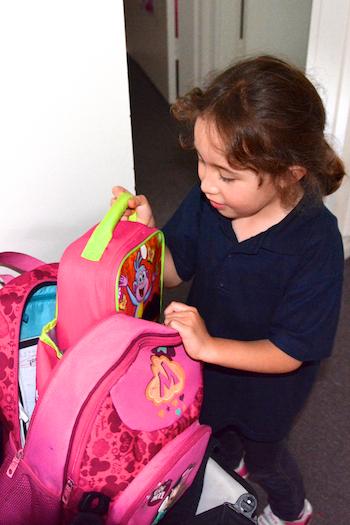Coming home
Duration/age

The bell has rung, the bag is packed. Open the door and off goes the pack.
It is the end of the school or kindy day and time to go home. How will you get home? Do you travel home the same way every day or do you sometimes walk? If you walk do you travel the same way as you would in the car or is there a shortcut?
Do you have a regular routine when you get home? Are there jobs to do? Or does a long day mean you are both hungry and food comes first before any jobs?
Before we go inside we need to check the letterbox for mail.
I have cut up fruit to eat, but first you need to unpack your bag.
What are you going to eat? Is it just a snack or will it be a main meal after the school day?
Sometimes you might have prepared some food before you pick up your child. Other times you might wait to see what sort of thing they want to eat and you can ask them to help.
Once you have washed your hands you can help me to get the fruit and cut it up. You can pick from banana, strawberries and kiwifruit.
Skills this activity improves
Why does this matter?
Having regular routines helps your child to predict what will happen, listen to directions and develop independence. As your child follows routines, they are experimenting with ordering and grouping using time and location. “We will get the letters before we have a snack because we walk past the letterbox on the way to the front door.”
When your child asks for changes in their routine, they are experimenting with using language to describe their thinking. As they communicate their ideas they are learning to negotiate, make choices and to listen to the ideas of another person. “If we walk home today could we have a picnic at the playground on the way home?”
What does this lead to?
As children explore family routines they are learning to make predictions, take control of the environment and to negotiate the outcome of an event. When a routine is familiar and planned they can begin to suggest changes to the routine and explain their reasoning.
When you talk with your child about what will happen and the order it will happen in, they are developing an understanding of time and sequence. By talking about time as a routine or an event, children are developing an understanding that time can be described using both words and numbers.
Language to use
- First, next, last, following, later
- Morning, evening, home time, dinner time, mealtime, before school, after school
- School, kindy, home, playground, room, kitchen, front door
- Route, direction
- Routine, planned
Questions to use
- Which way will we go home today?
- What do we need to do as soon as we get home?
- How hungry are you?
- Is there stuff in your bag you need to get out?
- Where does your bag and lunch box need to go?
Useful tips
- You might also like to take a look at the activities Routines and Packing up the toys.
- If you have a little baby they may need your attention first. Talk to your child about how they could help you to settle your baby.
- Remember to talk to your child in your home language.
More ideas
- You could write up your own timetable and routine for when you get home.
- You could make a recipe book of after-school snacks. Let you child pick from the book before they leave in the morning.
Variation by age
Three to five year olds
- Take photos of where to put everything.
- Make a list of the different ways you can travel to get home. Predict what you might see on the way.
- Time how long it takes you to travel each route.
- Ask your child to pick a route to travel based on the time it takes.
- Ask your child to help you make the after-school snack.
- Ask your child to pour the drinks.
Questions to ask
- What do you feel like eating today?
- Are you very hungry or just a little?
- How much time until we get home?
- Which way should we go today?
- Which direction is the quickest and which is the longest?
- Which route do you like the best?
Language to use
- Hungry, thirsty
- Food, drink
- Direction, route, distance, way
- Time, speed, quick, slow


